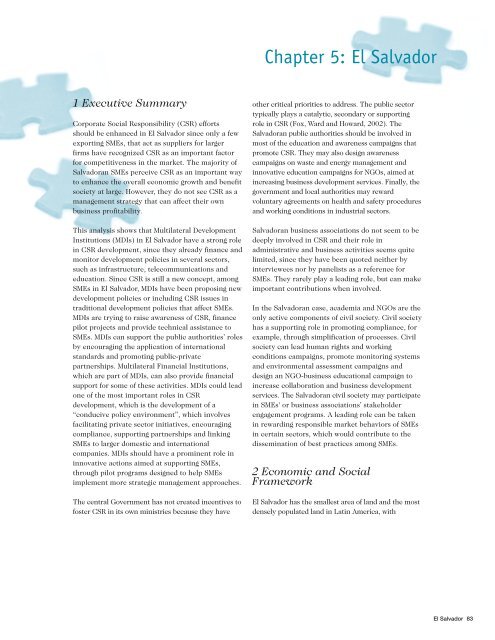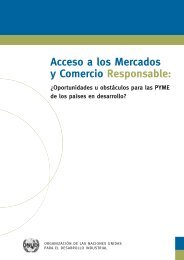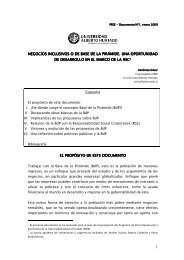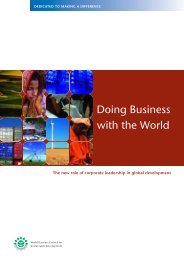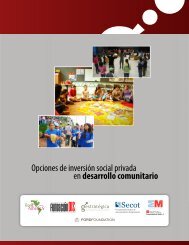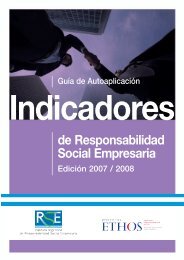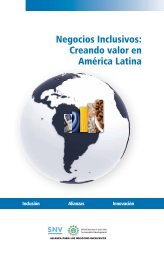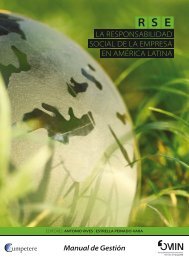Recommended actions to foster the adoption of Corporate Social ...
Recommended actions to foster the adoption of Corporate Social ...
Recommended actions to foster the adoption of Corporate Social ...
Create successful ePaper yourself
Turn your PDF publications into a flip-book with our unique Google optimized e-Paper software.
Chapter 5: El Salvador1 Executive Summary<strong>Corporate</strong> <strong>Social</strong> Responsibility (CSR) effortsshould be enhanced in El Salvador since only a fewexporting SMEs, that act as suppliers for largerfirms have recognized CSR as an important fac<strong>to</strong>rfor competitiveness in <strong>the</strong> market. The majority <strong>of</strong>Salvadoran SMEs perceive CSR as an important way<strong>to</strong> enhance <strong>the</strong> overall economic growth and benefitsociety at large. However, <strong>the</strong>y do not see CSR as amanagement strategy that can affect <strong>the</strong>ir ownbusiness pr<strong>of</strong>itability.This analysis shows that Multilateral DevelopmentInstitutions (MDIs) in El Salvador have a strong rolein CSR development, since <strong>the</strong>y already finance andmoni<strong>to</strong>r development policies in several sec<strong>to</strong>rs,such as infrastructure, telecommunications andeducation. Since CSR is still a new concept, amongSMEs in El Salvador, MDIs have been proposing newdevelopment policies or including CSR issues intraditional development policies that affect SMEs.MDIs are trying <strong>to</strong> raise awareness <strong>of</strong> CSR, financepilot projects and provide technical assistance <strong>to</strong>SMEs. MDIs can support <strong>the</strong> public authorities’ rolesby encouraging <strong>the</strong> application <strong>of</strong> internationalstandards and promoting public-privatepartnerships. Multilateral Financial Institutions,which are part <strong>of</strong> MDIs, can also provide financialsupport for some <strong>of</strong> <strong>the</strong>se activities. MDIs could leadone <strong>of</strong> <strong>the</strong> most important roles in CSRdevelopment, which is <strong>the</strong> development <strong>of</strong> a“conducive policy environment”, which involvesfacilitating private sec<strong>to</strong>r initiatives, encouragingcompliance, supporting partnerships and linkingSMEs <strong>to</strong> larger domestic and internationalcompanies. MDIs should have a prominent role ininnovative <strong>actions</strong> aimed at supporting SMEs,through pilot programs designed <strong>to</strong> help SMEsimplement more strategic management approaches.The central Government has not created incentives <strong>to</strong><strong>foster</strong> CSR in its own ministries because <strong>the</strong>y haveo<strong>the</strong>r critical priorities <strong>to</strong> address. The public sec<strong>to</strong>rtypically plays a catalytic, secondary or supportingrole in CSR (Fox, Ward and Howard, 2002). TheSalvadoran public authorities should be involved inmost <strong>of</strong> <strong>the</strong> education and awareness campaigns thatpromote CSR. They may also design awarenesscampaigns on waste and energy management andinnovative education campaigns for NGOs, aimed atincreasing business development services. Finally, <strong>the</strong>government and local authorities may rewardvoluntary agreements on health and safety proceduresand working conditions in industrial sec<strong>to</strong>rs.Salvadoran business associations do not seem <strong>to</strong> bedeeply involved in CSR and <strong>the</strong>ir role inadministrative and business activities seems quitelimited, since <strong>the</strong>y have been quoted nei<strong>the</strong>r byinterviewees nor by panelists as a reference forSMEs. They rarely play a leading role, but can makeimportant contributions when involved.In <strong>the</strong> Salvadoran case, academia and NGOs are <strong>the</strong>only active components <strong>of</strong> civil society. Civil societyhas a supporting role in promoting compliance, forexample, through simplification <strong>of</strong> processes. Civilsociety can lead human rights and workingconditions campaigns, promote moni<strong>to</strong>ring systemsand environmental assessment campaigns anddesign an NGO-business educational campaign <strong>to</strong>increase collaboration and business developmentservices. The Salvadoran civil society may participatein SMEs' or business associations’ stakeholderengagement programs. A leading role can be takenin rewarding responsible market behaviors <strong>of</strong> SMEsin certain sec<strong>to</strong>rs, which would contribute <strong>to</strong> <strong>the</strong>dissemination <strong>of</strong> best practices among SMEs.2 Economic and <strong>Social</strong>FrameworkEl Salvador has <strong>the</strong> smallest area <strong>of</strong> land and <strong>the</strong> mostdensely populated land in Latin America, withEl Salvador83


